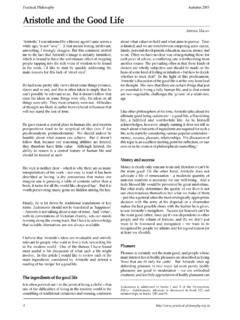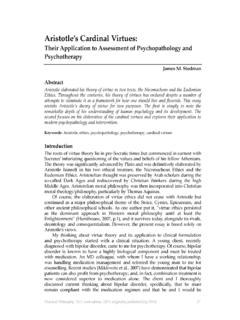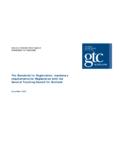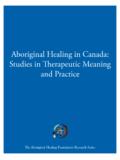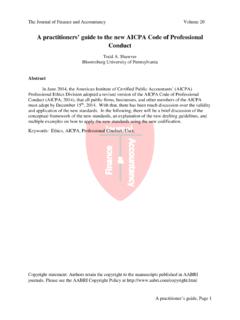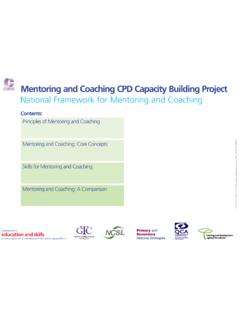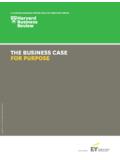Transcription of The Meaning of ‚Counsellor‛ - About the Society
1 Practical Philosophy, 10:1, (web edition, 2011; originally published July 2010) 17 The Meaning of Counsellor Sam Brown I do not believe that psychological counselling can legitimately lay claim to the notions of counselling and counsellor as it predominantly does. (Schuster, 1999, ) Introduction In 2007, the Health Professions Council (HPC) initiated proposals for state regulation of the professional titles counsellor and psychotherapist , with the ostensible goal of protecting vulnerable members of the public from inadequately-trained practitioners. In 2008 a Professional Liaison Group (PLG) was created to determine proficiency standards and consult with relevant professional organisations. Under current plans the titles counsellor and psychotherapist (and modified variants thereof) will be protected by law from 2012, and any practitioners who wish to continue to use them must register with the HPC or risk a fine of up to 5000.
2 Existing practitioners who meet the new standards of training and proficiency may qualify via the grandparenting route, on payment of a scrutiny fee of 420, and a registration fee of 76. Entry to the profession will require the successful completion of a relevant course specially approved by the HPC. It is as yet unclear whether this legislation will prohibit the use of the professional title philosophical counsellor in the UK. The title is in use by practitioners throughout the world and represented by national and international professional associations most notably in the UK, USA, Germany, Netherlands, and Israel (see, for example, Lahav & Tillmans, ed., 1995, passim). The PLG has not reflected on the semantic foundations of the term they seek to regulate, and are set to impose a psychologised conception with universal application without considering the limitations of its scope.
3 The proposals have already proved highly controversial, with many professional counselling and psychotherapy organisations lodging official objections and pledging Yet the HPC has already stipulated that the title counsellor must be protected. The PLG committee is therefore facing a serious, seemingly intractable, problem. To be consistent with their own recommendations, they could choose to discuss the predicament with an expert in psychological assessment and therapy, which may help to attenuate their feelings of discontent (and perhaps assuage their guilt). However, closer examination reveals that the problem is rooted in a basic conceptual confusion, and it would therefore be more constructive to examine the Meaning of their concepts, the veracity of their founding assumptions and the validity of their logic.
4 To invoke a pertinent metaphor, the PLG might benefit from a little philosophical therapy . 1 The Alliance for Counselling and Psychotherapy, which was formed to oppose the regulation in its current form, has gained considerable momentum: Sam Brown The Meaning of Counsellor Practical Philosophy, 10:1, (web edition, 2011; originally published July 2010) 18 The HPC s clinical conception of COUNSELLOR In 2009, following a lengthy consultation process, the PLG published a draft list of minimum proficiency standards expected of registrants. In the current version, there is an emphasis on assessing and diagnosing clients, developing a suitable treatment program and monitoring the progress of therapy. There are numerous references to psychological difficulties, psychological theory and evidence, diagnosis, treatment, therapy, therapeutic outcomes, health, disease, disorder, dysfunction, infection control, scientific enquiry, research methodologies, and multi-disciplinary teamwork.
5 Psy-chotherapists and counsellors alike must demonstrate adequate training and proficiency in each of these topics. The proficiency standards are clearly based on a template for clinical professions, and have no direct relevance to philosophical counsellors . While the PLG has insisted that its measures will not impose a medical model on counselling relationships,2 it retains a firm commitment to psychological training and qualific-ations, the observation and diagnosis of clients, and the delivery and evaluation of therapeutic programmes in a clinical setting. These recommendations are contrary to the humanistic methods employed in the majority of private counselling practices. In general, the HPC s proposals have not been well received by professional counselling organisations.
6 Leading practitioners have disputed whether the termin-ology of medicine, psychology and therapy is applicable to most forms of psycho-therapy and counselling. Many will refuse to subscribe to the register as a matter of principle, even if they do meet the The distinction between psychotherapy and counselling None of the reports by the PLG or the organisations it has consulted defines the key terms explicitly or analyses their semantics. Opinions differ markedly. Some respondents assert that counselling is synonymous with psychotherapy . For instance, the British Association for Counselling and Psychotherapy contends, BACP's position has consistently been that there is no difference between counselling and psychotherapy. In terms of role, value and effectiveness, we believe that each occupational area has equal value.
7 Many of our members use these terms interchangeably depending on the environment they are working in. Indeed, BACP's research committee which comprises international scholars of counselling and psychotherapy were unable to differentiate between the two on the basis of evidence. (BACP, 2008) 2 From the HPC FAQ, question 8 (HPC, 2008, ): We recognise that many psychotherapists and counsellors do not work within the National Health Service (NHS) or other 'medical settings' and that many psychotherapists and counsellors do not work to the 'medical model'. We recognise that psychotherapy and counselling are not 'medical modalities'. 3 Formal responses from experienced practitioners in the Alliance for Counselling and Psychotherapy dispute the suggestion that their professions can be regarded as health care services and protest that mental health concepts will distort the humanistic essence of their approach.
8 Sam Brown The Meaning of Counsellor Practical Philosophy, 10:1, (web edition, 2011; originally published July 2010) 19 Following consultation, however, the PLG decided to distinguish the two groups on the basis of expertise and qualifications. According to their draft requirements, psychotherapists must be qualified to Level 7 (Master s degree) and demonstrate the ability to diagnose and treat severe mental disorders , whereas counsellors require a minimum Level 5 qualification (HND/DipHE) from an approved counselling course and must demonstrate the ability to promote mental health and wellbeing (HPC, 2009b, ). These constitute, in effect, the HPC s operational definitions of psychotherapist and counsellor . The PLG has noted that the term counsellor is already in use by other professions in limited circumstances ( 76, see below), and is prepared to consider making exceptions for special cases, thereby implying that their conception has prior claim on the title.
9 However, a crucial fact has been overlooked: the word counsellor has no essential connection to therapeutic practices, psychological theories, treatments for disorders, or mental health concepts. (In this respect, it contrasts with its more technical counterpart, psycho-therapist , which was coined specifically to refer to the treatment of disorders by psychological interventions.) The term is being misappropriated. The Meaning of Counsellor : Lexicographical analysis Lexicography offers little support for the HPC s operational definition of COUNSELLOR as a psychological therapist. Some sample definitions are offered The sole definition in the MacMillan Dictionary is: counsellor: noun (countable) someone whose job is to give advice and help to people with problems.
10 This simple definition is wholly compatible with all forms of professional consultation for people seeking help with problems. It does not specify the nature of those problems. There is no allusion to psychological theory or practice, and no mention of mental health concepts. In the online Free Dictionary by Farlex, the following senses are listed: coun sel or also coun sel lor n. 1. A person who gives counsel; an adviser. 2. An attorney, especially a trial lawyer. 3. A person who supervises young people at a summer camp. The only profession noted here is attorney . Once again, there is no mention of psychology or mental health. Much closer scrutiny is required to discern any trace of psychology in the semantics of the term. The most authoritative reference guide in the English language is of course the Oxford English Dictionary, which offers a thorough, documented, history of usage.
